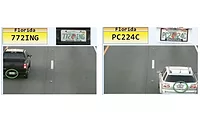License Plate Scanners Lead to 89 Arrests
Since taking effect Aug. 11, 2010 the Columbia, S.C. Police Department's license plate scanners have resulted in 50 arrests.
Columbia police began using the devices, which use Automatic License Plate Recognition, on Aug. 11 and within 30 minutes had a hit that led to an arrest.
Through Nov. 14, 2010, Columbia police arrested 50 people as a result of the scanners. The department has one on the back of a patrol vehicle and a street crimes unit vehicle. The 50 arrests resulted in 42 misdemeanor charges and nine felony charges as well as the recovery of five stolen vehicles and four stolen license plates.
"I'm real happy with the results," said Columbia police Lt. Brian Richenberger, who has been monitoring the implementation of the cameras. "It works. One of these days it will help crack a very important case."
At least one of the two Columbia police vehicles equipped with a scanner is on the streets 24 hours a day, Richenberger said. The scanner also has assisted in developing leads for burglary cases since its implementation.
"It has been described as a force multiplier, and we have found that to be true," he said. "It allows us to do our job better and more efficiently. That is an advantage to the taxpayer. We are allowed to do more with less."
The Boone County Sheriff's Department has also implemented the technology on a patrol vehicle and a traffic unit vehicle. From July 30 through Nov. 27, the scanners have contributed to 39 arrests and approximately 56 charges, Maj. Tom Reddin said.
Most arrests are in response to misdemeanor warrants, he said, but it also has assisted in the recovery of stolen vehicles and license plates. "The officer can only run so many plates," Reddin said. "This is an automatic way to do it. It's running plates constantly against the hot list."
The "hot list" is a database containing license plate numbers of wanted vehicles or suspects linked to those vehicles. The database is updated at least twice a day by the FBI's National Crime Information Center and by law enforcement agencies that enter the license plate numbers. A match sounds an alarm in the vehicle to alert the officer. The system can scan more than 3,000 license plates per day.
The sheriff's department and Columbia police tested the scanners for a 60-day period in 2009 before purchasing the equipment with funding through Community Oriented Policing Services---- via the U.S. Department of Justice. (www.columbiatribune.com)
Looking for a reprint of this article?
From high-res PDFs to custom plaques, order your copy today!






